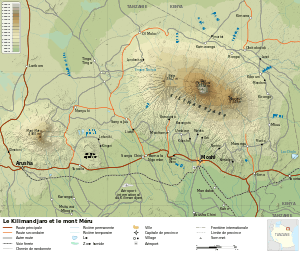College of African Wildlife Management

The College of African Wildlife Management (CAWM) commonly known as Mweka College or just Mweka, is located near the Village of that name on the southern slopes of Mount Kilimanjaro in Tanzania, above the city of Moshi, about 14 kilometres north of its centre.
The locality also gives its name to the Mweka Trail, one of the routes on Kilimanjaro, used for the descent.
Following the independence of Tanganyika in 1961, the College of African Wildlife Management was established in 1963 by Bruce Kinloch as a pioneer institution for the training of African wildlife managers. Initial funding for Mweka was provided by the African Wildlife Leadership Foundation (now known as the African Wildlife Foundation), the U.S. Agency for International Development, and the Frankfurt Zoological Society, with facilities donated by the government of Tanganyika. Since this time, the College has been a leader in providing quality wildlife management training in Africa, and has trained over 5,000 wildlife managers from 52 countries worldwide (28 African countries and 24 other countries in the world), the majority are working in protected areas throughout sub-Saharan Africa.
The majority of the College's students come from the SADC region, although the College opens its doors to all students with an interest in African wildlife management. A good number of students also come from countries such as Western and Eastern Europe, United States, India, Sri Lanka, Japan and many other countries.
The College has led the field of wildlife management training in Africa for 42 years, receiving a number of awards and accolades including the prestigious UNEP Sasakawa Environment Prize and being declared a centre of excellence as a Wildlife Training Institute by the East African Community.
The college was founded with stringent academic discipline, its qualifications being justly renowned both within Tanzania and internationally. Good staff and facilities, both academic and sporting, guaranteed a high standard of education and therefore of graduate too.
The college, in theory, serves two main purposes:
1) To prepare both local and international students for work within the national parks and reserves of Tanzania and whole Africa.
2) To prepare students for work within the safari industries (photographic & hunting) within Tanzania and whole Africa.
See also
- Erasto Mpemba, discoverer of the Mpemba effect, who published his results while a student at the College.